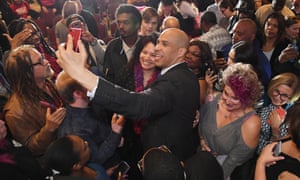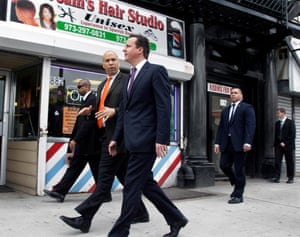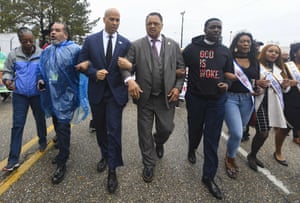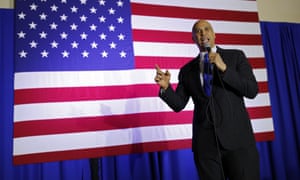Cory Booker
Cory Booker: Ivy League elite or hunger-striking hero?
The New Jersey senator wants to take on Trump in 2020, but what sort of president would he be? His background offers many mixed clues

Photograph: Ethan Miller/Getty Images
Cory Booker came to national attention in 2002, fighting an election against incredible odds. In the contest for mayor of Newark, New Jersey, he faced both an entrenched incumbent who would later go to jail for corruption and an entire political machine focused on destroying his reputation. He lost, but he lost narrowly.
Four years later, he won. In 2013, after serving nearly two terms, he won a special election for US Senate. In 2014, in a deep blue state, he cruised to re-election.
Now, Booker is facing his greatest political challenge. If he can overcome a score of hopefuls to win his party’s nomination for president, he will face a bruising general election against Donald Trump.
Hoping to follow Barack Obama as the second African American president, Booker is running a campaign that differs from many competitors. On the stump, he focuses less on policy than uplifting, optimistic rhetoric that frequently addresses the very concept of love.
But he comes from a different world. Obama was raised by his grandparents in an apartment building in Hawaii. Booker’s parents were two of the first black executives at IBM and his family was the first to integrate a leafy New Jersey suburb, Harrington Park. Booker often tells a story about how his parents worked with fair housing activists to integrate the town. They had to. Real estate agents, he says, would falsely tell African Americans asking about buying a house that the property was already sold.
Booker’s parents managed to buy his childhood home by having a white couple put down a bid, only for his father and a lawyer to show up instead at the closing. The real estate agent punched the lawyer and set a dog on Booker’s father. But the house was sold.
In a recent speech in Selma, Alabama, Booker said his “parents told me when I was sitting around the kitchen table, ‘Boy, you have to remember the struggles that got you here’”.
Growing up in the prosperous majority-white community, he has said, his family seemed like “four raisins in a tub of sweet vanilla ice cream”. Booker excelled as a high school athlete and was named Gatorade New Jersey Football Player of the Year. He earned a scholarship to Stanford, turning down an effort by former president Gerald Ford to recruit him for the University of Michigan.
Booker’s college football career was not a success. A backup tight end, he didn’t catch a pass until his junior year and mostly played special teams. But he was more than a jock. He worked in a crisis counseling center, was elected class president and wrote columns for college papers.
Those columns have provided fodder for opponents. For a student, he was perhaps unusually introspective. He wrote about groping a fellow teen when they were 15, and about how his experience working with rape survivors changed his views on sex and gender.
Another column was about overcoming homophobia. “I hated gays,” he wrote. “The disgust and latent hostility I felt toward gays were subcategories of hatred, plain and simple.”
But he also wrote that “it didn’t take me long to realize that the root of my hatred did not lie with gays but with myself. It was my problem. A problem I dealt with by ceasing to tolerate gays and instead seeking to embrace them. In these efforts I have found another community with which I feel akin and from which I draw strength. The gay people with whom I am close are some of the strongest, most passionate and caring people I know and their demands for justice are no less imperative than those of any other community.”
Booker went to Oxford, as a Rhodes scholar. There, he developed a lifelong interest in Judaism and became the first non-Jew to lead the L’Chaim Society. He went on to attend Yale Law School, where he co-founded another Jewish group. Booker now keeps a Jewish Bible on his desk, along with a Christian Bible, the Qur’an and the Bhagavad Gita.
‘I’m going to move to Newark’
His time at Yale also saw him get involved in Newark, New Jersey, the city he would lead and where he still lives. He moved to the city 30 miles south of his childhood home during his third year at Yale. Inspired by Geoffrey Canada, the founder of the Harlem Children’s Zone, he wanted to undertake a similar effort. He described the decision in an interview with Yale Law’s magazine:
“I’m going to move to Newark and I’m going to dive into a community and try to be a part of social change within a community. Once I made that decision, more and more people seemed to appear … to guide me into making things work.
Living in Brick Towers, a public housing project, he found himself running for the city council against a longtime incumbent tied to the Newark political machine. As Booker described it, “it was a very big switch and it was a switch I had to make spiritually because, frankly, I didn’t view politicians in all that great a light”.
He won and the New York Times attributed his victory to his “nontraditional technique of knocking on nearly every door in the district”.

His first year in office was a struggle.
“I was having a really bad time,” he said in a 2008 interview. “I was even having a bad time justifying being a city council person because I wasn’t feeling like I was making the kind of change that I was elected to make and even people who believed in me thought that by electing me a city council person I could get things done. I felt like they were losing faith or getting frustrated as well.”
So Booker went on a hunger strike. The longtime vegetarian fasted for 10 days, aiming to draw attention to crime. While doing so, he lived in a tent. He went on to live in a motorhome for a summer, going from one crime-ridden corner of the city to another in an effort to draw attention. The stunts did more than that. They were a way for Booker, a lone reformer, to get things done. As he told New York Magazine in 2018, “when there’s no systems and no efficiency, it’s the squeaky wheel that gets the oil, and so if I took pictures of potholes and pushed them out to the community, it would get action really, really quick.”
Booker also distinguished himself as an advocate for charter schools. In a 2000 speech at the center-right Manhattan Institute, he said: “Public education is the use of public dollars to educate our children at the schools that are best equipped to do so – public schools, magnet schools, charter schools, Baptist schools, Jewish schools.” In a 2014 interview he said this meant he “became a pariah in Democratic circles for taking on the party orthodoxy on education”. However, he noted, it also meant he gained “all these Republican donors and donors from outside Newark, many of them motivated because we have an African American urban Democrat telling the truth about education”.
Ever since, the political left has harbored concerns about Booker. Jeff Hauser, chief executive of the Revolving Door Project and a longtime Democratic operative, said: “Booker seems to have made some alliances early on that made sense and may have been necessary to try to dislodge a thoroughly corrupt political machine in Newark.” But, Hauser said, this involved “a universe of hedge fund executives who were deeply committed to the theory that America’s inequities were caused by public school teachers”.
While that “association has decreased noticeably over time”, Hauser said, “it definitely created a significant level of distrust between Booker and significant elements of the labor movement that he has worked pretty hard to overcome since he became a senator”.
‘You have to learn to be black’
In 2002, Booker ran for mayor against longtime incumbent Sharpe James. He raised more than $3m, much of it from outside the city, for a brutal campaign that was documented by an Oscar-nominated documentary, Streetfight. James accused Booker of being white, Jewish and gay, smearing him as being insufficiently black to lead a city like Newark.
“You have to learn to be black, and we don’t have time to teach you,” James taunted.
The Newark mayor used his power freely. City inspectors would show up at businesses sporting Booker signs and say they were violating city codes. Police officers took the signs down. The race didn’t turn Booker into a winner – he lost by 53%-47% – but it did turn him into a national figure and a symbol of a new generation of African American leadership.

Four years later, Booker ran again. James decided not to run and Booker won easily. Two years later, James went to prison on charges connected to the city selling land to his mistress. He was the third former mayor of Newark since the 1960s to be convicted in federal court.
Booker’s time in charge of Newark met with mixed reviews. He took over a city with deep structural problems, on the eve of the 2008 recession. An attempt to reshape Newark’s schools with the aid of $100m from Mark Zuckerberg did not live up to expectations. But Celia King, who leads Leadership Newark, a not-for-profit focused on public policy, saw Booker’s tenure as a plus.
“I think people who were external to the community and did not have confidence in the community started flocking to this change and to this new person,” she said, “and people began to have a tremendous amount of faith in his ability and the change he was going to do.”
She also noted the “high expectations and tremendous amount of pressure” Booker faced but thought he brought the city’s profile up and that his mayorship has had a lasting effect.
In 2013, the New Jersey senator Frank Lautenberg died at the age of 89. In a four-way primary against two members of Congress and the speaker of the state assembly, Booker won easily. He then coasted to victory in a general election against Steve Lonegan, a legally blind Tea Party activist with a history of controversial comments.
The election brought new scrutiny. In particular, questions were raised about a longstanding anecdote Booker used in speeches, about a drug dealer named “T-Bone” who he said lived near him in inner-city Newark. National Review reported that “T-Bone” was in fact a composite of several people. Booker had conceded that “although T-Bone’s corporeal being is 1,000% real, he’s an ‘archetype’ of an aspect of Newark’s woe whose actual nom de crack may not actually be T-Bone”. There were several criminals in Newark who used the name T-Bone at the time.
‘Side by side with people who are struggling’
As, at first, the only African American Democrat in the Senate, Booker built a national profile quickly, even being considered as a running mate for Hillary Clinton in 2016. But it was the election of Donald Trump that really boosted his visibility, as a member of the judiciary committee.
He made headlines by becoming the first sitting senator to testify against a colleague in a confirmation hearing, when Jeff Sessions was nominated to be attorney general. Booker said:
The arc of the moral universe does not just naturally curve toward justice, we must bend it. America needs an attorney general who is resolute and determined to bend the arc. Senator Sessions’ record does not speak to that desire, intention or will.
He also received national attention for his performance during the confirmation hearings for supreme court justice Brett Kavanaugh, when Booker announced he would publish confidential documents that raised questions about Kavanaugh’s views on racial justice. The documents turned out to have been cleared for release the night before. Other Democrats backed Booker and he jokingly compared himself to Spartacus. The moniker has stuck on the right, as a pejorative.
Now, as a presidential candidate, Booker has built a strong campaign apparatus and has been endorsed by almost every major Democratic politician in his home state. He has signed on to key progressive priorities such as Medicare for All and the Green New Deal and he cuts a unique figure by still living in a lower-income neighborhood in Newark, across the street from an outpatient recovery house. Robert Budsock, chief executive of Integrity House, says that gives Booker a unique perspective, “living in a neighborhood where he is able to live side by side with people who are struggling”.
The question is whether the Democratic electorate is ready for Booker’s brand of politics in the age of Trump. Hauser, the Democratic operative, described the senator as “dead set in the center of the party”, a politician who recognizes that “a broad swathe of the country is increasingly populist on economic issues.

“There is deep-seated bipartisan anger towards Wall Street,” he said, “[towards] big pharma and big tech platforms, but there also skepticism towards austerity in the realm of fiscal policy and no appetite whatsoever for a view to reduce spending on social security and Medicare.”
Observers on the right saw Booker tilting left. Andy Surabian, a Republican strategist and former Trump White House official, said: “Cory Booker is incredibly overrated as a politician and would have a much better chance if, instead of trying to appeal to the hard left, he embraces who he really is, which was a moderate pro-business Democrat.”
Yet ideology may not matter as much as rhetoric. Amy Nielsen, the first Iowa state legislator to endorse a 2020 candidate, said she gravitated to Booker because of “his message of unity, healing and just his passion and positivity going forward”.
In her view, “We’re going to have a very large field of Democrats [with] basically the same ideas and values and what’s going to matter is who is going to get those things done. I feel very strongly that Senator Booker has skills and experience and attitude to start healing the country from hateful and divisive rhetoric so that we can move forward.”
Source: Elections - theguardian.com




